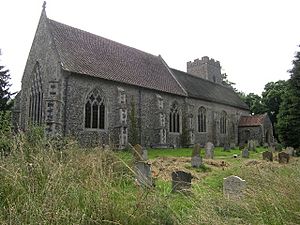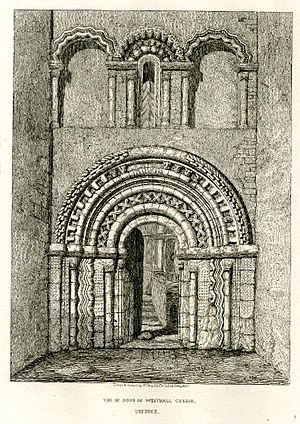St Andrew's Church, Westhall facts for kids
Quick facts for kids St Andrew's Church, Westhall |
|
|---|---|
 |
|
| OS grid reference | TM4232580434 |
| Location | Church Hill, Westhall, Suffolk IP19 8NU |
| Country | England |
| Denomination | Anglican |
| Churchmanship | Central Anglican |
| History | |
| Status | Parish church |
| Architecture | |
| Functional status | Active |
| Heritage designation | Grade I |
| Designated | 1 September 1953 |
| Architectural type | Church |
| Administration | |
| Parish | Westhall |
| Deanery | Waveney and Blyth |
| Archdeaconry | Suffolk |
| Diocese | St Edmundsbury and Ipswich |
| Province | Canterbury |
St Andrew's Church is a special old church found in the village of Westhall. This village is close to Halesworth in England. It is an active Anglican church, which means it is part of the Church of England. It serves the local community as a parish church. The church belongs to the Diocese of St Edmundsbury and Ipswich.
Contents
Church Design and History
St Andrew's Church is built from flint stone. It has a main area called a nave, a side section known as a south aisle, a chancel (the area around the altar), and a tower.
This church has a very unusual design. The tower was built in the 13th century. Later, a bell-stage was added to the top. The tower splits into two directions. One part goes east and was built by the Normans around 1100. The other part goes north. This northern section is a large 13th-century nave with a thatched roof. It has pews from the 1800s. Beyond this nave is the chancel, which was built in the 14th century.
The church's strange layout happened because it was extended over time. The original Norman church building became what is now the church's south aisle. The eastern entrance, from around 1100, still shows old stone carvings. These carvings include human and animal figures, like bird heads and human-animal mixes. Some faces were never finished.
Inside the Church: Font and Screens
In the main part of the church, the nave, you will find a special font. A font is a basin used for baptisms. This font has eight carved panels. Seven of these panels show important church ceremonies called sacraments. One panel shows the Eucharist, which is a holy meal. This image was even used on the cover of a famous book called The Stripping of the Altars by Eamon Duffy. The eighth panel on the font shows the baptism of Jesus.
The nave also has a painted screen. This screen shows pictures of different saints. On the south side of the screen, you can see Saints Etheldreda, Sitha, Agnes, Brigit of Kildare, Catherine of Alexandria, Dorothy, Margaret of Antioch, and Apollonia.
On the north side of the screen, there are images of Saint James, St Leonard, Saint Michael, and Saint Clement. Also on this side are pictures of the Transfiguration of Jesus. This scene shows Jesus on a mountain with Moses and Elijah. It is the only medieval screen in England that still shows the Transfiguration. The last panel on the north side shows Saint Anthony of Egypt.
Old Wall Paintings
On the north wall of the church, there is a painting of Saint Christopher. Other figures, including Moses, are also in this painting.
Other old paintings can be found on the walls. There is a special cross surrounded by flowers next to the south door. This is called a consecration cross. There is also a painted alcove in a window on the south wall. Near this alcove and cross, you can still see parts of a large painting. It has seven big round shapes surrounded by leaf designs.
Monuments and Brass Plaques
In the south-east part of the church, there is a tomb for Nicholas Bohun, who passed away in 1602. This tomb has a brass plaque. On the south wall, you can see the coat of arms for George III, a former king.
In the chancel, there are pieces of two old brass plaques that once showed chalices (special cups). The ceiling of the chancel shows the Holy Trinity. This painting shows God the Father holding Christ on the cross between his knees.
Historic Building Status
St Andrew's Church is a very important historical building. It was given a "Grade I" listing on September 1, 1953. This means it is considered a building of exceptional interest.
See also
- Grade I listed buildings in Suffolk


